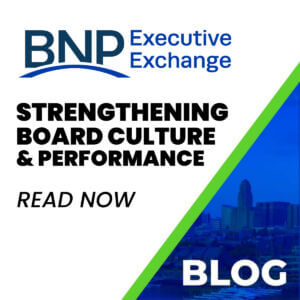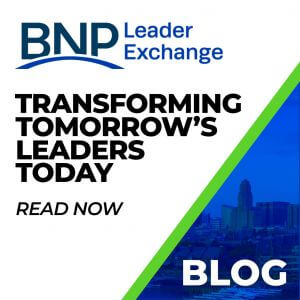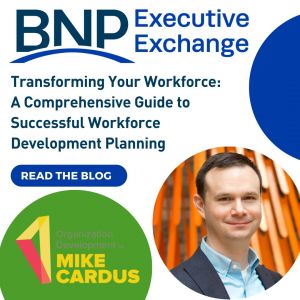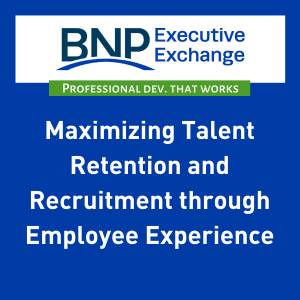Using the power of assessments to guide organizational transformation
Anne M. Moretti
Executive Exchange facilitator
August 16, 2024
Blog Categories
In today’s dynamic business environment, focusing on new ways of working, new capabilities and new technologies shape the way forward. While many leaders seek to capture untapped potential or to realize gains in change or growth, organizational transformations are not easy to get right.
Organizational transformation is a strategic method of getting your organization from where you are now to where you will need to be in the future. The most successful transformations turn ideas into detailed transition plans with trackable, time-bound metrics to measure outcomes. Ultimately, these plans result in value creation, cost savings, growth opportunities, optimization, reskilling and other improvements.
Depending on the type of transformation, it is essential for leaders at every level to align culturally, inter-operationally and strategically.
Researchers have found that in successful transformations, leaders not only make sure their teams have the processes, resources and technology they need — they also build the right emotional conditions.
There are a range of interventions that leaders can implement to facilitate organizational transformations. Therefore, it is essential to analyze the organization’s capability and readiness for change upfront.
Here's what we know about current workforce trends (from Gallup 2024):
- Only 23% of U.S. employees strongly agree that they trust the leadership of their organization.
- Only 23% of employees strongly agree that they get the right amount of recognition for the work they do.
- More than half of employees (53%) say they don’t feel prepared to work with AI or other upcoming technologies.
- 51% of currently employed workers say they are watching for or actively seeking a new job.
- Only two in 10 employees feel connected to their organization’s culture.
- On average, 40% of employees speak up. Quiet quitting is multiplying in workplaces, and with it comes the widespread feeling that it’s simply not worth it to speak up about problems at work.
Are your employees engaged, connected to your culture and invested in leadership’s goals? If you don’t know, find out. Being responsive to employees and the changing workplace ensures your organization won’t have to grapple with failed initiatives and broken morale.
Start asking the right questions, uncover the uncommon knowledge about your organization and stay ahead of workplace trends through these types of assessments.
Transformation assessment
Determine what’s changing. Transformation assessments analyze the type and extent of the changes required, readiness and how it will affect different areas of the organization – such as employees or teams, processes, technology, culture and competency.
Prior to and during the transformation process, assessments provide crucial information and feedback about the “state of the state,” potential strategies and measures of progress for achieving the desired transformation.
From our experience, implementing a relevant and useful transformation assessment and fully integrating it into strategic, operational and people processes allows organizations to acquire real time internal knowledge and the data necessary to pinpoint issues to strategize and successfully drive change efforts.
Some organizations flounder during transformation because too many initiatives are going on at once, spreading the organization’s resources too thin. Accordingly, what an organization chooses not to do is every bit as important as what it does. Organizations that excel at implementation foster a leadership style that sets a vision and inspires others while defining clear accountabilities – emphasizing the challenging and supportive dimensions of leadership during transformation.
Leadership capability assessment
The need for effective leadership during transformations today is also unprecedented. Gaps in the leadership pipeline from the frontline to executive levels, changing leadership requirements, inadequate leadership capabilities and the greater need to grow talent internally all point to the importance of assessing leadership capability. Sustainable organizational transformation requires a solid leadership pipeline with development systems available to consistently guide and shape leadership aptitude.
During a transformation, our team evaluates competency and skills at every level to determine leadership capabilities. These capabilities are then linked to the organizational transformation assessment to determine impact on factors such as communication, culture, morale and performance.
As stated by Peter Drucker, “What gets measured, gets managed.”
One might add: What goes unmeasured – or gets measured only superficially – risks being mismanaged or, at least, undermanaged.
Assessments, surveys & focus groups
For over 30 years, our team has developed and implemented a wide range of assessments, surveys and focus groups to strengthen capability, coach and develop talent, align and enhance performance, redesign process and systems, enhance change transformations, strategize business for the future, and improve the overall health and well-being of organizations from the board room to the frontline.
Secure your seat in the Buffalo Niagara Partnership's Executive exchange to learn more about how you can elevate executive performance and learn with an inner circle you trust.
About the Author

Anne M. Moretti, President of Moretti Consulting, LLC, BNP Executive Exchange facilitator, brings 25+ years of executive level management and organizational development consulting experience. Her consulting expertise focuses on Executive & Leadership Development, Assessments, Board Development, Change Management, Team & Organizational Effectiveness, Talent Management & Succession, and Strategic Planning in a wide range of industries and non-profit organizations. A recipient of Business First’s Pathfinders Award and former Board President & Chair for the Niagara Frontier Industry and Education Council, Anne served on boards in the community such as the American Cancer Society and the United Way. She also designed/taught the 2-day, Board Effectiveness Certificate Program at UB’s Institute for Nonprofits with Linda Nenni, Esq. Anne is a member of numerous professional organizations and serves as visiting faculty at regional universities, including the University at Buffalo’s Centers for Leadership & Organizational Development and Entrepreneurial Leadership.
About the Executive Exchange
The BNP's Executive Exchange is a program tailored exclusively for C-suite and senior executives where organizational leaders engage in intimate conversations driven by experienced facilitators. Executive Exchange groups are carefully curated to maximize impact, and each participant receives development opportunities customized to their individual needs.
Apply today and join your peers to explore strategies, solve problems and gain actionable insights.
Related Posts
Strengthening Board Culture and Performance
Nurturing a healthy board culture is paramount for achieving effective governance and high performance. Getting governance right calls for boards to hit their own “refresh” button as they adapt to changing expectations and circumstances. Here are five common disruptors that impede effectiveness, and how boards can address them to pave the way for positive change.
Transforming Tomorrow’s Leaders Today: Inside WNY’s Leader Exchange Program
With its practical curriculum, experienced facilitator, and focus on real-world application, the Leader Exchange Program sets a new standard in professional development. Find out what makes Leader Exchange different than any other leadership program in Western New York.
Transforming Your Workforce: A Comprehensive Guide to Successful Workforce Development Planning
In today’s rapidly changing business landscape, companies need to be able to adapt and evolve to stay competitive. One of the most critical elements of this is developing a workforce that is agile, skilled, and able to drive innovation.
Maximizing Talent Retention and Recruitment through Employee Experience
As a corporate business owner, you understand the importance of attracting and retaining top talent to succeed. However, with so many companies vying for the same pool of talented employees, it can be a challenge to stand out. One solution gaining popularity is Employee Experience (EX), which focuses on creating a positive and engaging workplace environment.




